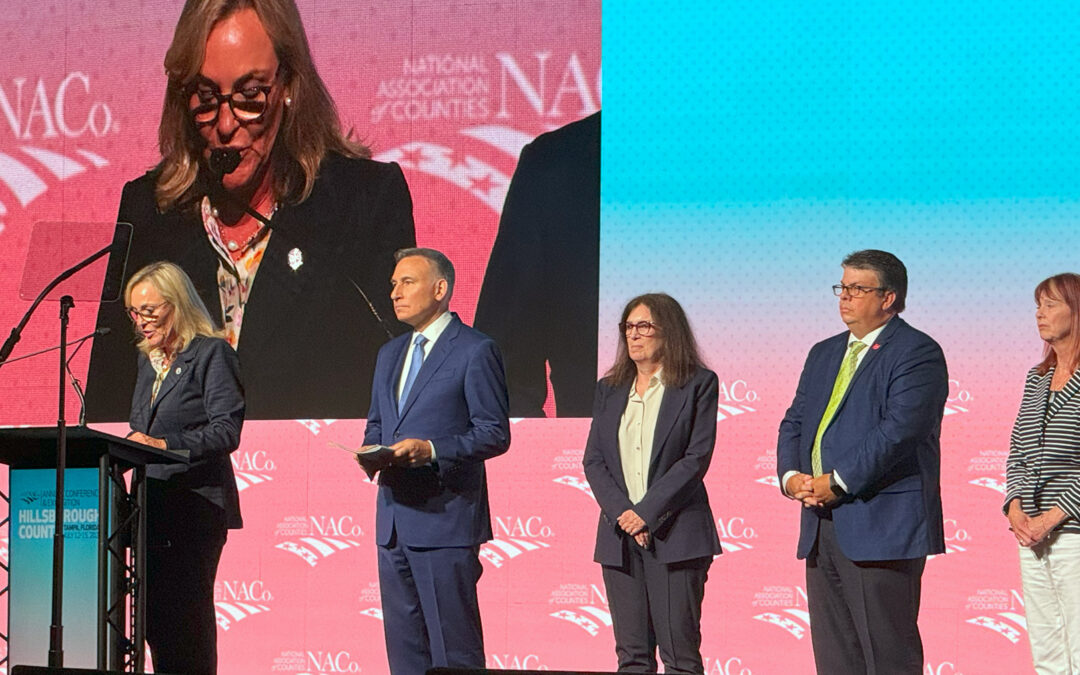
Jul 25, 2024 | Health & Human Services
NACo commission’s federal-county call to action
The NACo Commission on Mental Health and Wellbeing unveiled its final report at the annual conference in Tampa, Fla. Association of Oregon Counties (AOC) Executive Director Gina Nikkel served as a member of the commission. The report’s four federal policy priorities (plus two) align with AOC’s 2025 state legislative priorities and would increase access to quality local behavioral health services in every Oregon county. The report concludes with a matching call to action for county policy makers, outlining steps to lay the necessary groundwork in anticipation of successful advocacy in Washington, D.C.
Polk County Public Health Director Dr. Naomi Adeline-Biggs named new state public health division director
Oregon Health Authority (OHA) Director Sejal Hathi announced her appointment of Dr. Naomi Adeline-Biggs as OHA’s Public Health Division Director, effective Aug. 19. Along with an impressive history of practice and leadership abroad, Adeline-Biggs is the sitting chair of the Oregon Coalition of Local Health Officials. She was also a dynamic local public health presenter at the most recent AOC County College held in 2023.
The Oregon Criminal Justice Commission (CJC) publishes summary of county deflection program applications
In July, the CJC released a comprehensive summary of county deflection program applications. Twenty-seven Oregon counties will be standing up a new program, either individually or in partnership with a neighboring county. Marion County will use the new funds to bolster its deflection program which began in 2018. The new programs will go live on different schedules, starting in July and going through January 2025. Additional CJC materials on the deflection program, including a FAQ, can be found on the program webpage.
Contributed by: Jessica Pratt | Legislative Affairs Manager

Jun 27, 2023 | AOC News
National Association of Counties Commission on Mental Health and Wellbeing Amplifies Message at White House, on Capitol Hill
As a member of the National Association of Counties (NACo) Commission on Mental Health and Wellbeing, Gina Firman Nikkel, Ph.D, advocated last month in Washington, D.C. for policy priorities around mental and behavioral health. The commission also released new research highlighting county perspectives on this national crisis.
Part of Mental Health Awareness Month efforts, on May 10, the group joined the White House State and Local Partners Forum on Mental Health and Wellbeing, and on May 11, the commission met on Capitol Hill with the Bipartisan Mental Health Caucus and the Bipartisan Addiction Task Force. The commission shared crucial county perspectives geared towards strengthening the intergovernmental partnership and urging action to achieve shared goals.
“Counties in Oregon are the boots on the ground – and by law – the local mental health authority. We must continue to present the whole story of what is needed to coordinate and deliver an effective local continuum of care. This care should be driven by science not profit. It should be driven by people experiencing mental health challenges and addiction not commercialization. And, it should be driven by compassion not apathy,” stated Nikkel.
The commission released new data based on a survey of over 200 U.S. counties, with findings focused on the mental health landscape in counties and the areas of greatest need. Key takeaways from the research include:
- The nation is facing an acute escalation of the mental and behavioral health crisis.
- Seventy-five percent of counties reported an increase in incidence of behavioral health conditions in the last year, and 89 percent reported an increase compared to five years ago.
- Youth behavioral health needs are at the forefront of the crisis.
- Two-thirds (67 percent) of counties reported that youth behavioral health conditions are “definitely a problem” or “very prevalent and/or severe.”
- Limited access to services inhibits county residents from receiving the help they need.
- Seventy-four percent of counties cited financial costs as a barrier to expanding access to behavioral health services, and 71 percent cited lack of direct service providers.
- The crisis is exacerbated by a lack of behavioral health workers.
- Nearly three-quarters (72 percent) of counties consider the shortage of behavioral health workers in their county to be “definitely a problem” or “a severe problem.”
- The financial and human costs of behavioral health are compounding across all county systems.
- Eighty percent of counties indicated that they incurred associated costs in the legal system (courts and jails), 77 percent indicated associated costs in law enforcement, and 54 percent indicated associated costs in the health system and hospitals.
“This data released on behavioral health conditions by the NACo Mental Health Commission is significant and supports what our counties are experiencing on the ground in their communities. We must tackle the workforce shortages, unfair policies, and the risks of profit over personalized care,” stated Nikkel.
The new research pairs key findings with associated policy objectives, including:
- Amending detrimental policies under Medicaid, like the Medicaid Inmate Exclusion Policy (MIEP) and the Institutions for Mental Diseases (IMD) exclusion
- Obtaining direct and flexible resources to support the recruitment, training and retention of a sufficient behavioral health workforce
- Enhancing the intergovernmental partnership for the development and modernization of local crisis response systems and infrastructure, and
- Enforcing policies that ensure equitable coverage for treatment of mental illness and addiction.
The events last month marked the first in-person meeting of NACo’s Commission on Mental Health and Wellbeing since it was announced in February. The group is focused on building urgency, awareness, and crucial partnerships around the mental health crisis in America, with plans to release in-depth policy and programmatic recommendations in early 2024.
For more information about NACo’s Commission on Mental Health and Wellbeing, click here.


